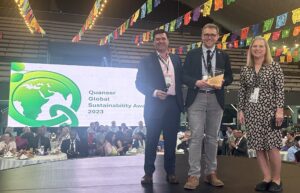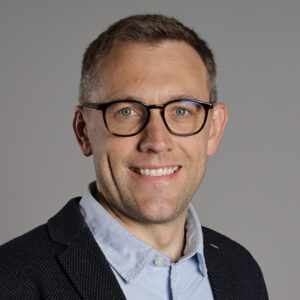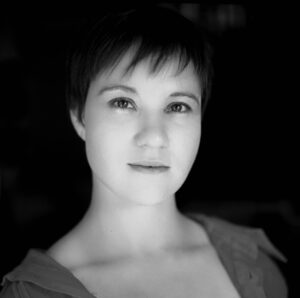
In partnership with IFEES and GEDC, Quanser is proud to announce the recipients of the industry’s influential Quanser Global Sustainability Award 2023. This annual award recognizes outstanding academic and research individuals committed to exploring and developing sustainable engineering methods in their respective fields.
This year’s winners are Dr. Calayde Davey and Dr. Johann van der Merwe from the University of Pretoria (South Africa), whose project titled “Transdisciplinary Education for Circularity in Construction – Leveraging Building Information Modelling for Material Reuse ” has left an outstanding educational impact and global community impact imprint. Their pedagogical initiative aims to instil interdisciplinary respect and appreciation to support the true collaboration needed to address sustainability issues in the built environment. The program also serves as a case study. On the one hand, it demonstrates how easy it is to educate across disciplines within the framework of existing fields; on the other hand, it demonstrates how beneficial it is to think of our urban landscapes as rich sources of materials that can be reused.
Dr. Calayde Davey and Dr. Johann van der Merwe were formally honoured at the awards ceremony held during GEDC&WEEF 2023 on October 24 in Monterrey, Mexico. This memorable event celebrated their outstanding achievements and was attended by deans of the world’s leading universities, leaders of engineering organizations, and researchers and scientists from industry.
Project representative Dr. Johann van der Merwe accepted the award at the ceremony and briefly introduced their project to the audience.

From left to right: Paul Gilbert, Quanser CEO; Dr. Johann van der Merwe, University of Pretoria;
Dr. Stephanie Farrell, Award Co-Chair, Rowan University
Winners introduction:
 |
Dr. Johann van der Merwe PrEng, Dr.sc.ETH Zürich
University of Pretoria Johann van der Merwe is a senior lecturer and researcher at the University of Pretoria, South Africa. His current research interests focus on improved sustainability through reduced embodied carbon of building structures. This includes a focus on improved circularity of building materials, timber engineering, and design for optimal structural form. |
 |
Dr. Calayde Davey MArch, Ph.D.
University of Pretoria Calayde is a highly accomplished professional with a Ph.D. in Environmental Design and Planning from the USA and a Master’s in Architecture from South Africa. She currently holds the position of Senior Lecturer at the Department of Architecture, UP, and serves as the project coordinator for the Hatfield Digital Twin City Initiative. |
Project Summary:
Transdisciplinary Education for Circularity in Construction
Leveraging Building Information Modelling for Material Reuse
The teaching initiative aimed to instil respect and appreciation between disciplines to support a level of true collaboration that is needed to address sustainability issues in the built environment. The project also serves as a case study. On the one hand, to demonstrate how simple it can be to accommodate transdisciplinary education within existing discipline frameworks, and on the other hand to serve as proof of concept for the benefit of viewing our urban landscapes as a rich source of material for reuse.
Throughout the initiative, the alignment of research interests between us strengthened and laid the foundation for future collaboration in teaching and research. Future research will build on the concept of this initiative and the lessons learned during the process.
Quanser Global Sustainability Award encourages the development of initiatives that prepare students to discover and develop sustainable engineering methods throughout their careers.
Any initiative focused on developing undergraduate or master’s-level engineering skills to tackle one or more sustainability issues is eligible for application. The initiative must be innovative and include a demonstrable alignment to learning outcomes. It should also have a measurable impact on the student’s understanding of sustainability and be demonstrably scalable (with appropriate funding) to ensure that it can expand to enhance the learning of future generations. Individual and team nominations are both welcomed.